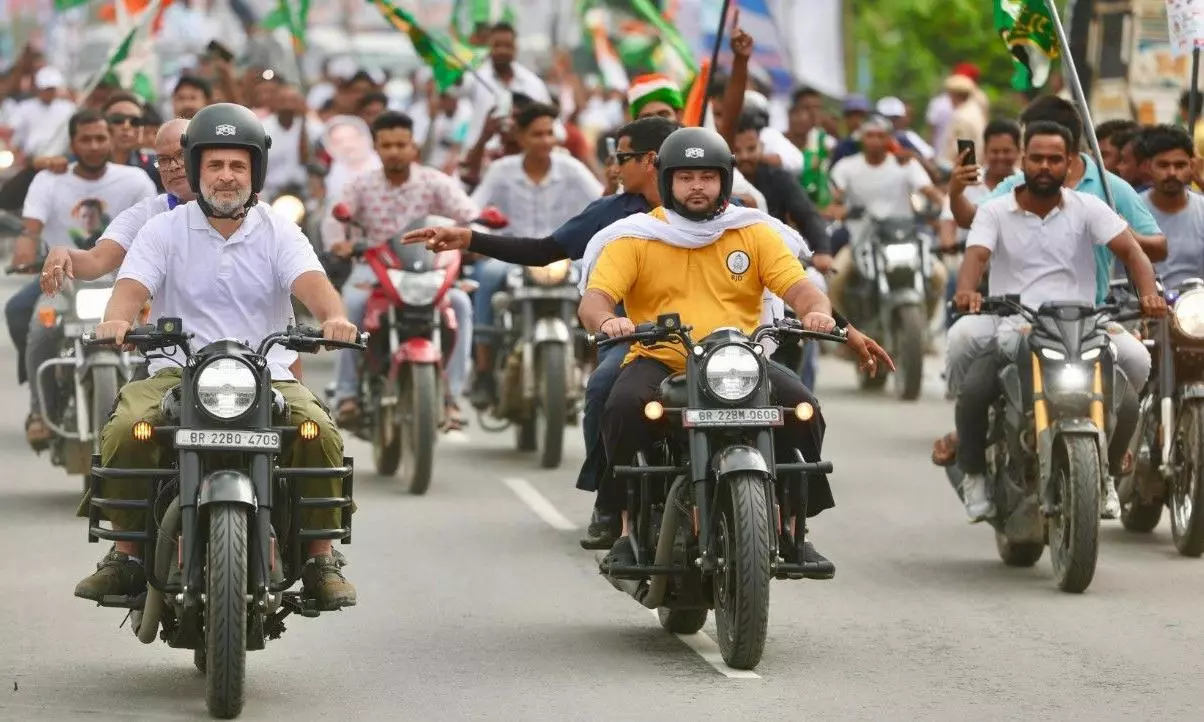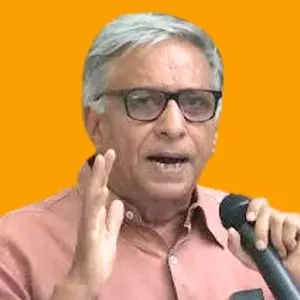
- Home
- India
- World
- Premium
- THE FEDERAL SPECIAL
- Analysis
- States
- Perspective
- Videos
- Sports
- Education
- Entertainment
- Elections
- Features
- Health
- Business
- Series
- In memoriam: Sheikh Mujibur Rahman
- Bishnoi's Men
- NEET TANGLE
- Economy Series
- Earth Day
- Kashmir’s Frozen Turbulence
- India@75
- The legend of Ramjanmabhoomi
- Liberalisation@30
- How to tame a dragon
- Celebrating biodiversity
- Farm Matters
- 50 days of solitude
- Bringing Migrants Home
- Budget 2020
- Jharkhand Votes
- The Federal Investigates
- The Federal Impact
- Vanishing Sand
- Gandhi @ 150
- Andhra Today
- Field report
- Operation Gulmarg
- Pandemic @1 Mn in India
- The Federal Year-End
- The Zero Year
- Science
- Brand studio
- Newsletter
- Elections 2024
- Events
- Home
- IndiaIndia
- World
- Analysis
- StatesStates
- PerspectivePerspective
- VideosVideos
- Sports
- Education
- Entertainment
- ElectionsElections
- Features
- Health
- BusinessBusiness
- Premium
- Loading...
Premium - Events

It appears increasingly clear that SIR is designed as a tool to further marginalise vulnerable Indians; it's no longer just a Bihar issue, but a national concern
The fortnight-long Voter Adhikar Yatra across Bihar, guided and navigated by Congress under Rahul Gandhi’s leadership and aided on the ground by RJD’s Tejashwi Yadav and CPI-ML (Liberation)’s Dipankar Bhattacharya, has the makings of a ‘New Bihar Movement’.
The student mobilisation of 1974, galvanised by Jaiprakash Narayan (JP), came to be known as the JP Movement or the campaign for ‘Total Revolution’. It later mounted a direct challenge to then Prime Minister Indira Gandhi’s Emergency, leaving a lasting imprint on Bihar and energising the youth across North India.
No longer a Bihar issue
The ‘New Bihar Movement’, though yet to match the revolutionary fervour of the JP-led youth uprising, nevertheless carries enough energy to confront the far-right leadership in New Delhi and its alleged use of a pliant Election Commission to disenfranchise large sections of voters and consolidate power.
Also read | Opposition in Bihar to counter Modi’s ‘mother insult’ charge with aggression
The Election Commission’s methods, widely criticised for sidestepping transparency, have been taken to the Supreme Court by Opposition parties, democracy watchdogs, and citizen groups. The court’s observations and interim orders indicate that the Congress party’s painstakingly compiled research into the ECI’s practices of allegedly denying ordinary people their vote is receiving close judicial scrutiny.
By now, it is equally clear that the issue has gained wide national visibility and stirred deep concerns about the health of Indian democracy.
With the Special Intensive Revision (SIR) of the electoral roll being undertaken nationwide, starting with Bihar, where Assembly polls are fast approaching, the spirited ‘New Bihar Movement’ is resonating far beyond the state’s borders. It is no longer just a Bihar issue, but a matter of national concern.
Tool to marginalise vulnerable
Drawing on his party’s research as well as his own analysis, Rahul Gandhi argues that the SIR is, at its core, both dangerous and politically motivated. He contends that it uses unfair and underhand methods to question the citizenship of a section of underprivileged Indians and, by extension, their right to vote. In doing so, it strips the poor of all their entitlements, since citizenship is the foundational “mother right” from which all others flow.
It appears increasingly clear that the SIR is designed as a tool to further marginalise vulnerable Indians, particularly on the basis of caste and religion, in order to tilt the electoral arena in favour of those who champion the interests, values, and cultural dominance of society’s upper crust.
The course set in motion by the Voter Adhikar Yatra must continue, in whatever form it evolves. Walking away is not an option. A vigil for democracy can only be sustained by remaining at the very site of struggle.
In this context, it can hardly go unnoticed that in his Independence Day address from the Red Fort this year, Prime Minister Narendra Modi emphatically declared his government’s plan to launch a Demography Mission to curb “illegal infiltration.” It would be interesting to know what informs such a notion.
Is “illegal infiltration” in India truly of a magnitude that it deserves a warning from the nation’s highest executive on such a solemn occasion? And is this premise grounded in data or shaped more by prejudice?
Advancing Demography Mission?
From the Election Commission’s newfound zeal for conducting the SIR nationwide, one might assume that foreign populations have somehow spread their tentacles across the states, subverting India’s citizenship rolls and requiring urgent disenfranchisement and removal.
Also read | SIR row flags crumbling of cadre infra that once anchored electoral democracy
To borrow a notorious McCarthy-era anti-communist trope, is the SIR being used to hunt for a “Red under every bed” in the name of advancing the government’s Demography Mission? In the Indian context, this seems a thinly veiled communal and anti-poor instrument, which can lead to violent protests.
So far, the BJP has offered no defence of the SIR beyond echoing the Election Commission’s feeble justifications. Yet elections are rarely decided by cogent arguments or reasoned debate. With roughly two months left before the Bihar state polls, the government still has a range of options to deploy.
No dearth of options
It may target top political opponents to intimidate others, and on the eve of the election, it could resort to inducements, rolling out eye-catching schemes aimed particularly at women voters. A similar tactic was attempted in Maharashtra last year, though the scheme was subverted once the BJP and a breakaway Shiv Sena faction secured victory.
Alternatively, the government could fall back on the “Modi card,” as it recently did in Darbhanga, north Bihar, where an angry individual publicly hurled abuses at the prime minister. The BJP president, the Union home minister, and Modi himself sought to portray the incident as a Congress–RJD conspiracy, as though the man had been planted to insult the nation’s leader. Does that even sound plausible? Yet in its nervousness, the BJP clung to this narrative and went so far as to demand an apology from Rahul Gandhi.
The foul language, rightly to be denounced, was used by the frustrated individual well after the Congress–RJD leaders had addressed a roadside gathering and departed. Yet, intriguingly, a video clip of the episode found its way almost instantly into the hands of a senior BJP national spokesperson.
BJP’s conspicuous silence on SIR
But there was more to come. BJP volunteers staged a scuffle at the Congress headquarters in Patna, Sadaqat Ashram, and went on to hurl abuses at Sonia Gandhi while attempting to enforce a bandh, a “shut down the city” spectacle by the ruling coalition.
Such theatrics are not new to Bihar’s politics, but what stands out this time is the direct involvement of figures as senior as the prime minister, the home minister, and the ruling party’s president.
On the core issue of the SIR and the people’s right to vote, the ruling party has remained conspicuously silent, strengthening the impression that the outrage over insults to the prime minister is a diversionary tactic. Can such theatrics derail a people’s movement? Unlikely. But that hardly means the electoral process is beyond manipulation.
Need to uphold vigil for democracy
The course set in motion by the Voter Adhikar Yatra must therefore continue, in whatever form it evolves. Walking away is not an option. A vigil for democracy can only be sustained by remaining at the very site of struggle.
Also read | Congress counters EC’s ‘no objection’ claim, says it lodged 89 lakh complaints on SIR
It follows from the same line of thought that once people are politically mobilised, the absence of strategic organisation can lead to chaos. If their demand for the right to vote goes unmet, the risk of unplanned violence cannot be dismissed.
Every effort, therefore, must be made to channel this anger into non-violent and constructive forms of action. Rahul Gandhi, Tejashwi Yadav, and Dipankar Bhattacharya cannot afford to leave this to chance.
The Bihar election holds immense significance for those in power at the Centre. A victory would allow them to manoeuvre around almost any political challenge. Yet the vice-presidential election, an equally important test for Modi and Home Minister Amit Shah, will take place even before Bihar goes to the polls. A setback in either contest could open the floodgates to a broader political recession, including on the floor of Parliament.
(The Federal seeks to present views and opinions from all sides of the spectrum. The information, ideas or opinions in the articles are of the author and do not necessarily reflect the views of The Federal.)


